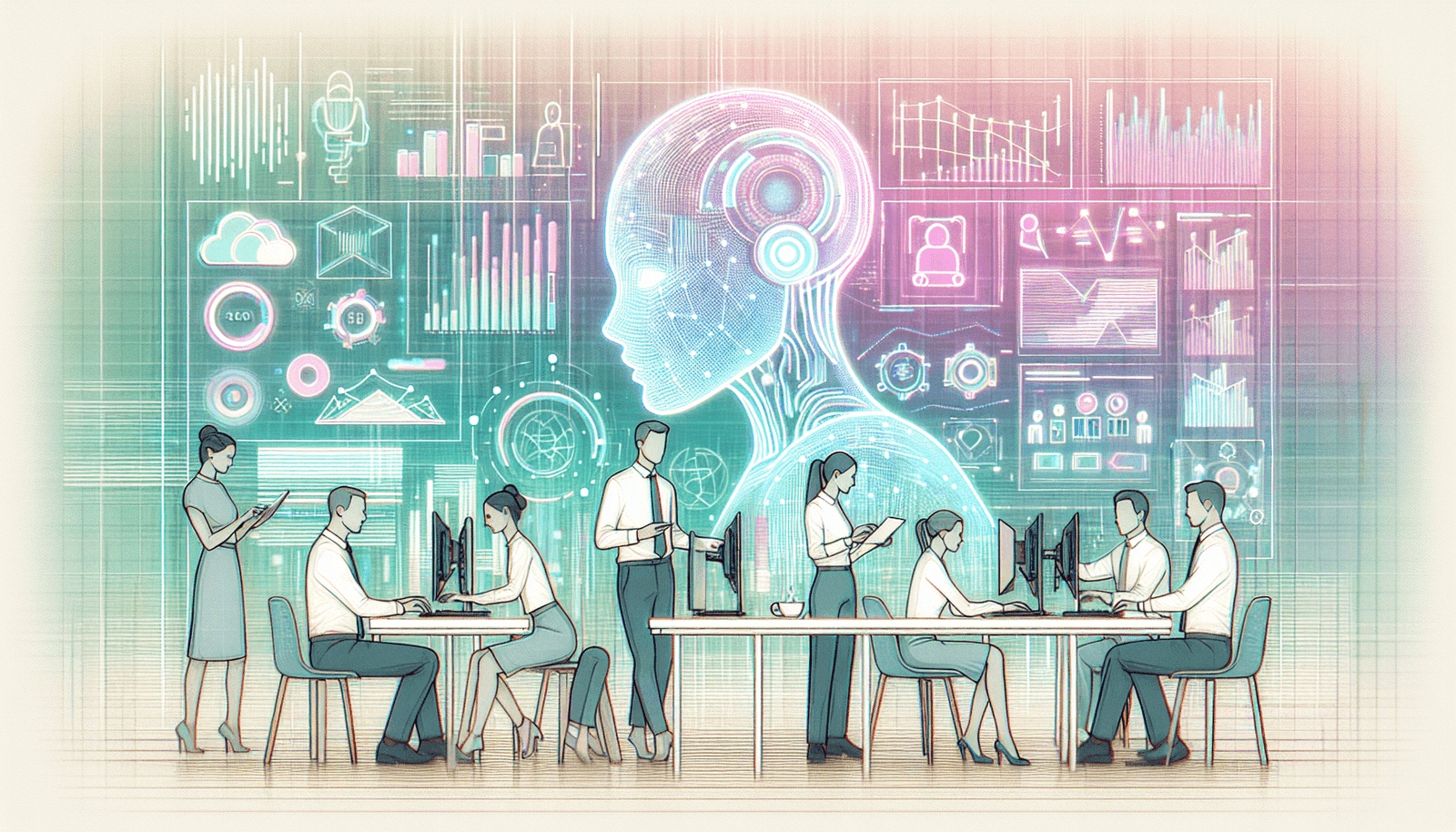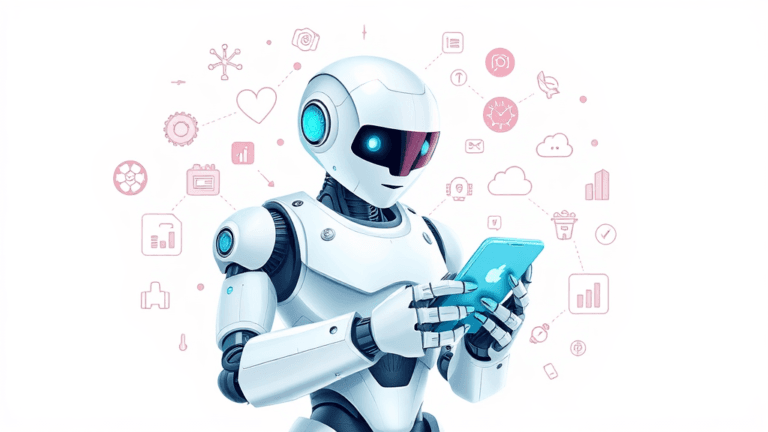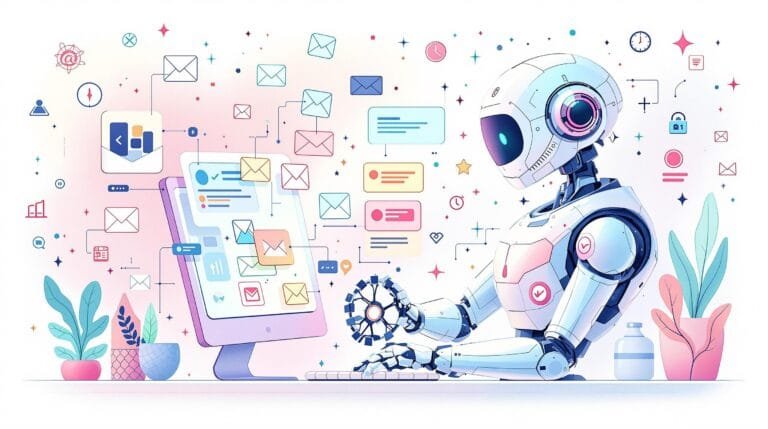
How AI Agents for Business Are Revolutionizing the Modern World
Estimated reading time: 12 minutes
Key Takeaways
- AI agents enhance decision-making and streamline business operations.
- They offer significant cost reductions and increased efficiency.
- Implementation requires careful integration and employee training.
- Future trends include advanced natural language processing and emotional intelligence.
Table of Contents
- Understanding AI Agents
- Intelligent Agents in Artificial Intelligence
- Examples of Intelligent Agents in AI
- Types of AI Agents for Business
- Benefits of AI Agents for Business Automation
- Implementing AI Agents in Your Business
- Challenges and Considerations
- The Future of AI Agents in Business
- Conclusion
Remember the days when you’d flip through pages of dusty files just to find one little piece of information? Oh, how far we’ve come! Today, businesses are transforming faster than a superhero in a phone booth, all thanks to rapid technological advancements. One of the key players in the digital evolution? AI agents for business. Now, let’s take a closer look at how these intelligent entities are not just helping businesses keep up with the times, but are putting them miles ahead.
AI agents are pivotal for businesses. They’re the unsung heroes revolutionizing decision-making and operational processes. Companies tapping into these smart assistants—AI agents—are reaping rewards, gaining a competitive edge. But what are AI agents exactly? Let’s unravel this mystery.
Understanding AI Agents
AI Agents Explained
AI agents are like the top-secret agents of the digital world. No tuxedos, but definitely packed with slick capabilities. These software entities can perceive their environment, make decisions, and take necessary actions to accomplish specific tasks. Think of them as the James Bonds of the tech world—only without the Aston Martin.
- General AI vs. Specialized AI Agents: While general AI might aim to do everything from painting art to arguing legal cases, AI agents for business are designed with precision—like a Swiss Army knife, but digital. They’re tailored for specific business functions that make them sharply efficient. For instance, see this comprehensive definition from Rapid Innovation, which explains how they work.
Intelligent Agents
If we take a closer look, an intelligent agent isn’t just smart—it’s practically a genius. Autonomous entities with the ability to react to their environment, make proactive decisions, and even interact socially. It’s like having a coworker who not only gets things done but anticipates problems before they even become obvious. Key characteristics include:
- Autonomy: They act independently.
- Reactivity: They adapt and respond to changes.
- Proactivity: They take initiative.
- Social Ability: Interaction-ready, just like that chatty friend who texts you at midnight.
Want to dive deeper into what makes an agent truly ‘intelligent’? TechForce Services offers brilliant insights.
Intelligent Agents in Artificial Intelligence
Artificial Intelligence and Intelligent Agents
Intelligent agents form the backbone of the AI revolution. Without these agents, AI would be like a high-performance car with wheels but no engine. They are the bridge connecting AI algorithms to real-world applications, turning theoretical capabilities into practical business solutions.
Intelligent Agent in AI
These agents are as versatile as your favorite tool box. Whether they employ machine learning, natural language processing, or a host of other advanced algorithms, their functionalities cover a broad spectrum. From simple rule-based systems all the way to learning algorithms capable of adapting and evolving, these agents are truly remarkable.
Examples of Intelligent Agents in AI
Intelligent Agent in Artificial Intelligence Examples
Let’s roll out some real-life heroes of the AI world. Here are examples of intelligent agents that are reshaping industries across the globe:
- Customer Service Chatbots: They’re like the friendly front desk at a hotel, handling inquiries and offering personalized assistance—24/7. No coffee breaks required!
- Autonomous Trading Agents: Picture them as the tireless day traders of Wall Street, continuously analyzing data and executing trades faster than any human could.
- Predictive Maintenance Systems: They’re the reliable mechanics in the manufacturing industry, monitoring equipment and scheduling repairs promptly before breakdowns occur.
- Virtual Assistants (like Siri or Alexa): Your own personal assistant, ready to play music, set reminders, or even tell a joke (if you’ve had a rough day). Check out more examples.
Types of AI Agents for Business
AI Intelligent Agent Types
Businesses are like snowflakes—unique yet under pressure to perform. Here’s how types of AI agents fit into their blueprint:
- Task-specific Agents: Just as the name suggests, they’re specialists in tasks like data analysis or customer support.
- Multi-agent Systems: When one agent’s good but a team is better. These systems work collaboratively to tackle complex issues.
- Learning Agents: Picture a diligent student that learns and improves through experience, a dream-coworker who grows smarter every day!
- Reactive Agents: They’re the quick responders, adapting to environmental changes without maintaining an internal state. Their motto? “See, react, conquer.”
Benefits of AI Agents for Business Automation
AI Agents for Business Automation
Now for the part everyone loves—return on investment. Here’s how AI agents for business are maximizing efficiencies.
- Increased Efficiency: AI agents handle repetitive tasks sans fatigue. They don’t sleep, complain, or charge overtime.
- Cost Reduction: With streamlined processes and reduced human error, operational costs plummet.
- Enhanced Decision-Making: They crunch real-time data swiftly, offering insights and clarity to decision-makers.
- Improved Customer Experience: Faster responses and personalized interactions keep customers happier, leading them right back to your door.
Some everyday tasks that see automation include data entry, customer inquiries, and inventory management.
Implementing AI Agents in Your Business
Steps to Integrate AI Agents
Implementing AI agents isn’t about flipping a switch. It’s more about a careful dance of steps:
- Identify Business Processes: Determine areas ripe for automation, like customer support or data analysis.
- Select Appropriate AI Agent Solutions: Choose wisely—ensuring solutions align with current infrastructure and business goals.
- Ensure Data Integration and Quality: What goes in is what comes out. Ensure high-quality data for AI effectiveness.
- Provide Employee Training: Employees need to play nice with AI agents—training ensures harmony.
Learn more. Don’t startle your workforce with machine overlords out of nowhere. Start with pilot projects, keep an eye on the results, and adapt.
Challenges and Considerations
Potential Obstacles
While AI agents are akin to gold mines, they’re not entirely without hurdles:
- Data Privacy and Security: Elevate those security measures—because sensitive information deserves protection.
- Ethical Implications: AI decisions should be fair and just—not dictated by inherent biases.
- Integration Difficulties: Sometimes like putting a square peg in a round hole, legacy systems present challenges.
- Resistance to Change: Humans are creatures of habit. Convincing them to welcome AI with open arms might need a little coaxing.
Involving employees, maintaining transparent operations, and addressing these concerns head-on often lead the way to success.
The Future of AI Agents in Business
Emerging Trends
Here’s a peek into the future—one where AI agents continue to reign:
- Advanced Natural Language Processing: Making those AI conversations as effortless as chatting with a friend.
- Explainable AI: Unpacking the black box, making AI decisions clear and understandable—because trust is everything.
- Integration with IoT Devices: A connected universe, where AI agents and IoT create harmonious symphonies.
- Emotional Intelligence in AI Agents: Because emotions matter, and understanding them makes agents more relatable.
Predicting new breakthroughs leads us to how they’ll enhance industries from healthcare to retail. Stay informed, keep investing, and prepare your workforce to embrace what’s next.
Conclusion
In this whirlwind journey, we explored how AI agents for business are storming the gates of modern enterprises, armed with automation and decision-making capabilities. Their role in streamlining operations, reducing costs, and enhancing customer interactions is nothing short of transformative. But as we dive deeper into the AI-driven world, it’s clear that the future holds even more tantalizing possibilities.
So what’s your take on this digital revolution fueled by AI agents? Are you ready to embrace these intelligent sidekicks and skyrocket your business to the realm of efficiency and innovation? Dive in, explore, and don’t forget to share your thoughts below!
FAQ
What are AI agents and how do they differ from general AI?
AI agents are specialized software entities designed to perform specific business functions, whereas general AI aims to handle a wide range of tasks across different domains.
How can AI agents improve decision-making in businesses?
AI agents analyze real-time data swiftly, providing accurate insights and clarity that aid in making informed and timely decisions.
What are the main challenges in implementing AI agents in a business?
Key challenges include data privacy and security, ethical implications, integration with existing systems, and resistance to change from employees.
What future trends can we expect in the development of AI agents?
Emerging trends include advanced natural language processing, explainable AI, integration with IoT devices, and the incorporation of emotional intelligence in AI agents.
How can businesses prepare their workforce for the integration of AI agents?
Businesses should provide comprehensive employee training, start with pilot projects, maintain transparent operations, and involve employees in the transition process to ensure harmony and acceptance.
Additional Resources
- AI Agents Explained: Rapid Innovation – Top 15 Use Cases of AI Agents in Business.
- Intelligent Agents in Artificial Intelligence Examples: TechForce Services – Benefits of Working with AI Agents.
- Salesforce Blog: Salesforce Blog – AI Agent for Small Business.
- Shelf Blog: The Evolution of AI: Introducing Autonomous AI Agents.
- HubSpot Community: How to Build a Better AI Content Generation Workflow.
Here’s to staying a step ahead in an AI-driven world!






